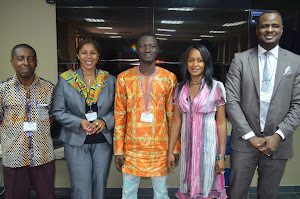BY EDMUND SMITH-ASANTE
“Whether they themselves are positioning themselves to meet the demand of the population is another, but the good thing is that Government has given them the space to partner with them to deal with it, but they themselves have to increase their pace of collection so that we can deal with it,” he said.
From a high rate of 52 per 100 persons that used
shared latrines in Ghana, the figure has dropped to 35 per 100 people,
according to the 2011 Multi Indicator Cluster Survey (MICS) report.
Disclosing this Sunday, May 19, 2013, Ibrahim Musah,
Head of Policy and Partnership, WaterAid Ghana, who was commenting on improved
sanitation coverage in Ghana, said: “The MICS report has just been
released and the report says as at 2011 we have moved just one percentage point
– from 14% to 15% while open defecation rate has increased from 19% to 23%, but
the good thing also is that shared latrine use has dropped from 52% to around
35%.”
Saying these were statistics that should gladden
every Ghanaian heart, he indicated that collection of solid waste though, still
had some few challenges with regards to the role of the private sector.
“Whether they themselves are positioning themselves to meet the demand of the population is another, but the good thing is that Government has given them the space to partner with them to deal with it, but they themselves have to increase their pace of collection so that we can deal with it,” he said.
Ibrahim Musah, who spoke on ‘WASH Radio’, a
programme on water, sanitation and hygiene by the Ghana Watsan Journalists
Network (GWJN) and aired on Radio XYZ (93.1fm) on Sundays from 7:00pm to 7:30pm,
was addressing a question on the hopelessness of Ghana’s sanitation situation.
“So it is not all that a hopeless situation, even
though we would have wished to be covered more, like we have in water, but that
is not the case,” he stated.
Sunday’s programme was a continuation of a discussion
began the previous week on Ghana’s Environmental Sanitation Policy.
Touching on ‘Elements of sustainable environmental
development’ as captured in the document, the WaterAid Ghana head of policy,
who intimated that his organisation took part in the revision of the 1999
policy to its present state, affirmed the formal establishment of environmental
sanitation as a sub-sector within the national development programme, had already
been accomplished.
Also accomplished is the establishment of a National
Environmental Sanitation Policy Co-ordination Council within the Ministry of
Local Government and Rural Development as spelt out in the policy document.
According to Ibrahim Musah, the council, which is
known as NESPOC, meets every quarter to review policy-related issues.
He also confirmed that as detailed by the policy,
the Local Government Ministry every year observes a national environmental sanitation
day and also organises an annual conference – NESCON, plus a national
sanitation week.
Musah however asserted that rationalisation of
institutional objectives and functions at all levels, including delineation of
responsibilities, as well as development, enforcing standards and bye-laws and
strengthening of the community’s role in environmental sanitation were
problematic and had to be looked at critically.
“That is what CLTS is supposed to do. We hope that
CLTS will achieve that, so that communities will take centre stage,” he noted,
decrying that some assemblies do not even have bye-laws on environmental
sanitation.
Concerning assigning delivery of a major proportion
of environmental sanitation services to the private sector through contract,
franchise, concession among others, Ibrahim Musah commended Government for
taking a step in that direction and also Zoomlion for its work and hoped
recycling plants being established by the private sector will be sustained.
WaterAid, an international non-governmental
organisation that has been present in Ghana for about 30 years, has been very
instrumental in many water, sanitation and hygiene interventions in Ghana.
WASH Radio, a collaborative effort between GWJN and
Radio XYZ, is an advocacy programme currently sponsored by WaterAid West Africa
(WAWA) and the Water Supply and Sanitation Collaborative Council (WSSCC).






No comments:
Post a Comment